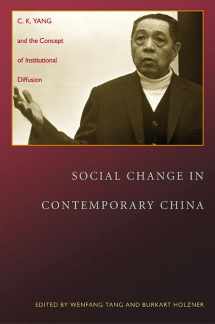
Social Change in Contemporary China: C.K. Yang and the Concept of Institutional Diffusion
ISBN-13:
9780822942979
ISBN-10:
0822942976
Edition:
1
Author:
Wenfang Tang, Burkart Holzner
Publication date:
2006
Publisher:
University of Pittsburgh Press
Format:
Hardcover
336 pages
FREE US shipping
Book details
ISBN-13:
9780822942979
ISBN-10:
0822942976
Edition:
1
Author:
Wenfang Tang, Burkart Holzner
Publication date:
2006
Publisher:
University of Pittsburgh Press
Format:
Hardcover
336 pages
Summary
Social Change in Contemporary China: C.K. Yang and the Concept of Institutional Diffusion (ISBN-13: 9780822942979 and ISBN-10: 0822942976), written by authors
Wenfang Tang, Burkart Holzner, was published by University of Pittsburgh Press in 2006.
With an overall rating of 3.6 stars, it's a notable title among other
books. You can easily purchase or rent Social Change in Contemporary China: C.K. Yang and the Concept of Institutional Diffusion (Hardcover) from BooksRun,
along with many other new and used
books
and textbooks.
And, if you're looking to sell your copy, our current buyback offer is $0.42.
Description
Social Change in Contemporary China offers a wide-ranging examination of Chinese institutional change in areas of education, religion, health care, economics, labor, family, and local communities in the post-Mao era. Based on the pioneering work of sociologist C. K. Yang (1911–1999), and his institutional diffusion theory, the essays analyze and develop the theory as it applies to both public and private institutions. The interrelationship of these institutions composes what Yang termed the Chinese “system,” and affects nearly every aspect of life. Yang examined the influence of external factors on each institution, such as the influence of Westernization and Communism on family, and the impact of industrialization on rural markets. He also analyzed the impact of public opinion and past culture on institutions, therein revealing the circular nature of diffusion. Perhaps most significant are Yang’s insights on the role of religion in Chinese society. Despite the common perception that China had no religion, he uncovers the influence of classical Confucianism as the basis for many ethical value systems, and follows its diffusion into state and kinship systems, as well as Taoism and Buddhism. Writing in the early years of Communism, Yang had little hard data with which to test his theories. The contributors to this volume expand upon Yang’s groundbreaking approach and apply the model of diffusion to a rapidly evolving contemporary China, providing a window into an increasingly modern Chinese society and its institutions.


We would LOVE it if you could help us and other readers by reviewing the book
Book review

Congratulations! We have received your book review.
{user}
{createdAt}
by {truncated_author}


